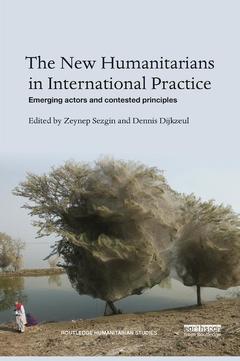The New Humanitarians in International Practice Emerging actors and contested principles Routledge Humanitarian Studies Series
Coordonnateurs : Sezgin Zeynep, Dijkzeul Dennis

As humanitarian needs continue to grow rapidly, humanitarian action has become more contested, with new actors entering the field to address unmet needs, but also challenging long-held principles and precepts.
This volume provides detailed empirical comparisons between emerging and traditional humanitarian actors. It sheds light on why and how the emerging actors engage in humanitarian crises and how their activities are carried out and perceived in their transnational organizational environment. It develops and applies a conceptual framework that fosters research on humanitarian actors and the humanitarian principles. In particular, it simultaneously refers to theories of organizational sociology and international relations to identify both the structural and the situational factors that influence the motivations, aims and activities of these actors, and their different levels of commitment to the traditional humanitarian principles. It thus elucidates the role of the humanitarian principles in promoting coherence and coordination in the crowded and diverse world of humanitarian action, and discusses whether alternative principles and parallel humanitarian systems are in the making.
This volume will be of great interest to postgraduate students and scholars in humanitarian studies, globalization and transnationalism research, organizational sociology, international relations, development studies, and migration and diaspora studies, as well as policy makers and practitioners engaged in humanitarian action, development cooperation and migration issues.
Introduction: New humanitarians getting old?Part 1 A brief history of humanitarian actors and the humanitarian principles 1.A brief history of humanitarian actors and principles Part 2 New donor humanitarianism 2. India as humanitarian actor: Convergences and divergences with DAC-Donor principles and practices 3. Turkey as a rising power: An emerging global humanitarian actor Part 3 Multi-Mandate organisations and developmental humanitarianism 4. Multi-Mandate organisations in humanitarian aidPart 4 Armed humanitarianism 5. Blurred lines, shrunken space? Offensive peacekeepers, networked humanitarians and the performance of principle in Democratic Republic Congo6. Rebels without borders: Armed groups as humanitarian actors 7. The military, the private sector and traditional humanitarian actors: Interaction, interoperability and effectivenessPart 5 Private humanitarianism 8. Business in humanitarian crises – For better or for worse?9. Humanitarian action for sale : Private military and security companies in the humanitarian space Part 6 Diaspora humanitarianism 10. Diaspora humanitarianism: The invisibility of a third humanitarian domain11. Diaspora humanitarianism: Implications for the humanitarian action in Syria and neighbouring countries Part 7 Faith-Based humanitarianism 12. International Muslim NGOs: "Added value" or an echo of Western principles and donor wishes? 13. Writing the other into humanitarianism: A conversation between "South-South" and "faith-based" humanitarianismsPart 8 Regional and local humanitarianism 14. Regional organisations and the humanitarian system: History, trends and implications 15. Traditional and non-traditional humanitarian actors in disaster response in India Conclusion
Zeynep Sezgin is Lise-Meitner Fellow of the Austrian Science Fund (FWF) and leads the research project "Legitimacy of Faith-Based Humanitarian Organisations in Austria, Germany and Pakistan" at the Department of Development Studies at the University of Vienna, Austria.
Dennis Dijkzeul is Professor of Conflict and Organisation Research at the Social Science School and the Institute for International Law of Peace and Armed Conflict (IFHV) at Ruhr University Bochum, Germany.
Date de parution : 12-2017
15.6x23.4 cm
Date de parution : 11-2015
15.6x23.4 cm
Thèmes de The New Humanitarians in International Practice :
Mots-clés :
transnationalism; neoinstitutionalism; constructivism; humanitarians; diaspora; non-DAC; globalization; disasters; war; conflict; legitimacy; refugees; migration; UNHCR; Red Cross; International Committee of the Red Cross; United Nations High Commissioner for Refugees; UNICEF; United Nations Children’s Fund; Doctors Without Borders; Medecins sans frontiere; Cooperative for Assistance and Relief Everywhere; World Vision International; Catholic Relief Services; Save the Children; OECD-DAC; Democratic Republic of Congo; DRC; Syria; Somalia; Sierra Leone; multi-mandated; organisational sociology; faith-based; military; Dennis Dijkzeul; Ryan O'Neill; Wolf-Dieter Eberwein; Bob Reinalda; Kristina Roepstorff; Alpaslan Özerdem; Dorothea Hilhorst; Eline Pereboom; Samuel Carpenter; Randolph Kent; Gilles Carbonnier; Piedra Lightfoot; Jutta Joachim; Andrea Schneiker; Cindy Horst; Stephen Lubkemann; Robtel Neajai Pailey; Marie Juul Petersen; Elena Fiddian-Qasmiyeh; Julia Pacitto; Lilianne Fan; Tony Vaux; Humanitarian Aid; Islamic Charity Centre Society; Good Humanitarian Donorship Initiative; Traditional Humanitarian Actors; United Nations Organization Stabilization Mission; SEWA Member; DAC Donor; Multi-mandate Organisations; Muslim Aid; non-DAC Donors; South Sudan; Turkish Red Crescent; IHL; Humanitarian Space; Red Crescent Movement; Humanitarian NGOs; Institutional Multiplicity; Diaspora Humanitarianism; International Stability Operations Association; International Islamic Charitable Organisation; Muslim NGOs; India's Foreign Policy Strategy; International Humanitarian System



